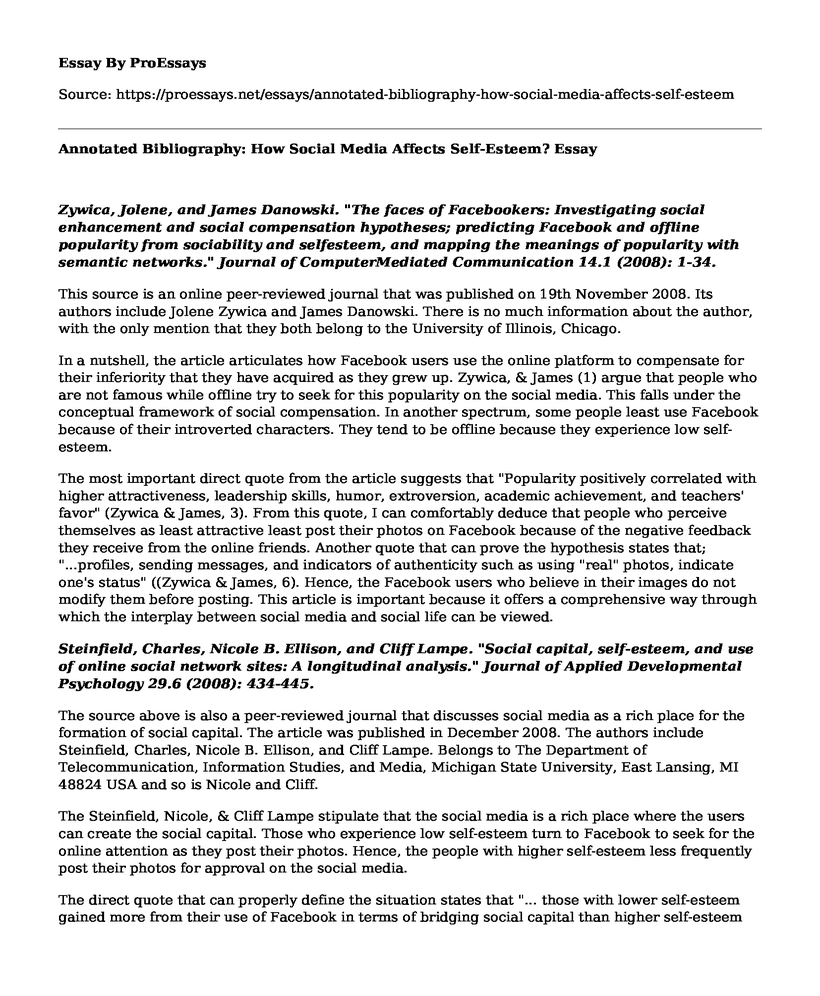Zywica, Jolene, and James Danowski. "The faces of Facebookers: Investigating social enhancement and social compensation hypotheses; predicting Facebook and offline popularity from sociability and selfesteem, and mapping the meanings of popularity with semantic networks." Journal of ComputerMediated Communication 14.1 (2008): 1-34.
This source is an online peer-reviewed journal that was published on 19th November 2008. Its authors include Jolene Zywica and James Danowski. There is no much information about the author, with the only mention that they both belong to the University of Illinois, Chicago.
In a nutshell, the article articulates how Facebook users use the online platform to compensate for their inferiority that they have acquired as they grew up. Zywica, & James (1) argue that people who are not famous while offline try to seek for this popularity on the social media. This falls under the conceptual framework of social compensation. In another spectrum, some people least use Facebook because of their introverted characters. They tend to be offline because they experience low self-esteem.
The most important direct quote from the article suggests that "Popularity positively correlated with higher attractiveness, leadership skills, humor, extroversion, academic achievement, and teachers' favor" (Zywica & James, 3). From this quote, I can comfortably deduce that people who perceive themselves as least attractive least post their photos on Facebook because of the negative feedback they receive from the online friends. Another quote that can prove the hypothesis states that; "...profiles, sending messages, and indicators of authenticity such as using "real" photos, indicate one's status" ((Zywica & James, 6). Hence, the Facebook users who believe in their images do not modify them before posting. This article is important because it offers a comprehensive way through which the interplay between social media and social life can be viewed.
Steinfield, Charles, Nicole B. Ellison, and Cliff Lampe. "Social capital, self-esteem, and use of online social network sites: A longitudinal analysis." Journal of Applied Developmental Psychology 29.6 (2008): 434-445.
The source above is also a peer-reviewed journal that discusses social media as a rich place for the formation of social capital. The article was published in December 2008. The authors include Steinfield, Charles, Nicole B. Ellison, and Cliff Lampe. Belongs to The Department of Telecommunication, Information Studies, and Media, Michigan State University, East Lansing, MI 48824 USA and so is Nicole and Cliff.
The Steinfield, Nicole, & Cliff Lampe stipulate that the social media is a rich place where the users can create the social capital. Those who experience low self-esteem turn to Facebook to seek for the online attention as they post their photos. Hence, the people with higher self-esteem less frequently post their photos for approval on the social media.
The direct quote that can properly define the situation states that "... those with lower self-esteem gained more from their use of Facebook in terms of bridging social capital than higher self-esteem participants" (Steinfield, Nicole, & Cliff Lampe, 2). This quotation directly confirms the hypothesis of the research. This article is important in my research because it directly answers my hypothesis.
Newsome, Teresa. "7 Ways Social Media Is Wrecking Your Self-Esteem." Bustle. N. p., 2016. Web. 25 June 2018.
The above source is an online non- academic source which enumerates some of the ways through which the social media can affect one's social being. The article was published in January 2016 as an online article in a freely accessible website. The author, Teresa Newsome is a blogger with no much academic qualification.
In this article, Teresa states that many social media users spend much of their time comparing themselves to others. In the process, the users form the perception of themselves depending on the feedback they get online. This, in effect, dictates what the users think about themselves and hence higher or lower self-esteem.
The appropriate direct quote from this article suggests that "Our social media profiles are an extension of our identity" (Teresa, web). This quote suggests that the Facebook users put much emphasis on the profiles they present on the social media platforms because the online friend gives feedback depending on the appearance of the profile pictures. This article is important because it provides a crude view of the issue at hand and provides a leeway for further researches.
Cite this page
Annotated Bibliography: How Social Media Affects Self-Esteem?. (2022, Jun 19). Retrieved from https://proessays.net/essays/annotated-bibliography-how-social-media-affects-self-esteem
If you are the original author of this essay and no longer wish to have it published on the ProEssays website, please click below to request its removal:
- The Movie "Dead Man Walking"
- Racism: Documentary Analysis Essay
- Essay Sample on Social Media's Effect on Community Involvement
- "Big Trouble in Little China" and "The 36th Chamber of Shaolin" - Films Analysis Essay
- Research Paper on 21st Century Cinema
- How Music in the Modern Era Affect Us as Human Beings Essay Example
- Painting Not Fresco - Free Essay Sample







